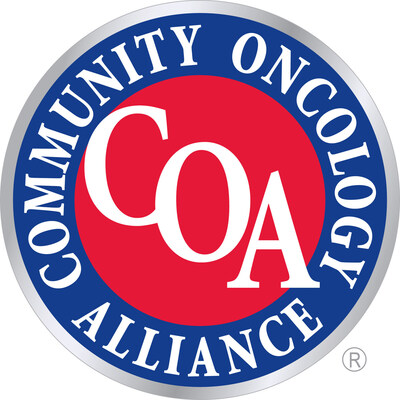Standards Provide a Roadmap for Practices to
Assess Their Operations, Consider Participation in Quality
Certification Programs, and Have Discussions with Key
Stakeholders
WASHINGTON, Sept. 10,
2024 /PRNewswire/ -- The Community Oncology Alliance
(COA) announced today the release of a set of Quality and Value
Standards for cancer care. The Standards serve as a foundation
for practices who wish to ensure the provision of high-quality
care, participate in certification programs, as well as discuss and
demonstrate what quality care is with patients, employers, and
other payers. They were released today at COA's annual Payer
Exchange Summit on Oncology Payment Reform.

Independent community oncology practices across the country are
providing patients with high-quality, evidence-based, and
cutting-edge cancer care that is affordable and accessible. Now,
these cancer providers are being challenged to communicate and
prove this commitment to patients, payers, and other stakeholders
to remain competitive. This is because overall cancer spending has
increased and the patient experience has deteriorated, often
because of the shift in site of service from the independent
provider to the hospital setting. COA developed the Quality and
Value Standards with this reality in mind.
"Those who receive and pay for cancer care want to know that
they are getting high-quality, personalized, evidence-based, and
value-driven care," said Miriam
Atkins, MD, FACP, president of COA and a practicing medical
oncologist at AO Multispecialty Clinic in Augusta, Georgia. "The COA Quality and Value
Standards are meant to serve as a foundational reference for
practices who wish to demonstrate how they meet the highest
standards in cancer care, discuss their efforts with payers, and
consider participation in certification programs."
Developed with expert opinion and physician input, the COA
Quality and Value Standards cover eight pillars of high-value,
patient-centered cancer care and personalized support services that
improve outcomes and lower the cost of cancer treatment. They
include:
- Patients and caregivers are engaged and educated as partners
throughout their cancer care journey.
- Patients have access to care teams and support outside of
regularly scheduled appointments and office hours, as needed.
- Practice provides evidence-based care, supports second
opinions, and provides education on, or access to, clinical
trials.
- Practice provides closely coordinated, integrated, team-based
cancer care to patients.
- Practice is committed to constantly improving quality and
ensuring patient satisfaction through ongoing efforts to track
processes, monitor safety, and assess patient care.
- Practice is committed to advanced care planning, advanced
directives, and other legal documents tailored to individual
patients.
- Practice care teams are trained and credentialed in the safe
administration of antineoplastic agents.
- Practice is committed to focusing on providing high-value
cancer care and lowering the cost of care and out-of-pocket
expenses patients face.
Oncology practices can use the COA Quality and Value Standards
as a reference to easily assess their operations and performance,
and prepare for participation in national certification programs,
networks, or initiatives, such as the ASCO Certified program based
on the Oncology Medical Home (OMH). Each of the Standards also seek
to align with existing leading national quality programs, including
the Enhancing Oncology Model (EOM), the National Committee for
Quality Assurance (NCQA), and the Institute for Healthcare
Improvement's (IHIs) "Triple Aim" framework. The COA Quality and
Value Standards are meant to provide a framework for practices to
begin their quality journey and are not a formal certification or
assessment program.
"'Quality' and 'value' have been buzzwords for decades in cancer
care. Even with the myriad of programs designed to define and
measure 'quality,' there remains a lack of alignment and consensus
on what that truly means – or worse, gross misrepresentation," said
Ted Okon, executive director of COA.
"There is not one single 'right' program or source when it comes to
defining cancer care quality and value. That is why COA developed
the Standards, to help advance the spirit of quality and value in
cancer care by consolidating, simplifying, and clearly
communicating the core of what we believe the key pillars to
be."
Faced with a variety of measures and messages from stakeholders
across the health care spectrum, it can be difficult to understand
what quality cancer care looks like. The Standards seek to define
quality in clear, easy-to-understand terms and empower practices to
both assess their performance, as well as demonstrate how they are
delivering on quality and value.
The COA Quality and Value Standards are free to access for all
oncology practices and stakeholders. They will be maintained by COA
and reviewed by an expert panel every three years to ensure they
meet evolving challenges and opportunities in cancer care.
Learn more at https://communityoncology.org/Standards.
About the Community Oncology Alliance
The
Community Oncology Alliance (COA) is a non-profit
organization dedicated to advocating for community oncology
practices and, most importantly, the patients they serve. COA is
the only organization dedicated solely to community oncology where
the majority of Americans with cancer are treated. The mission of
COA is to ensure that patients with cancer receive quality,
affordable, and accessible cancer care in their own communities.
More than 1.5 million people in the
United States are diagnosed with cancer each year and deaths
from the disease have been steadily declining due to earlier
detection, diagnosis, and treatment. Learn more about COA at
www.communityoncology.org.
 View original content to download
multimedia:https://www.prnewswire.com/news-releases/community-oncology-alliance-releases-quality-and-value-standards-in-cancer-care-302243773.html
View original content to download
multimedia:https://www.prnewswire.com/news-releases/community-oncology-alliance-releases-quality-and-value-standards-in-cancer-care-302243773.html
SOURCE Community Oncology Alliance